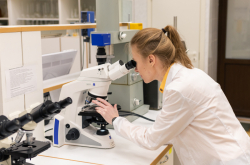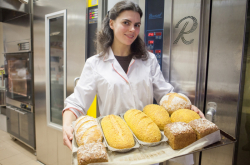The hackathon began in October 2024. Over six months, 110 ITMO Master’s students – or 12 teams in total – worked to solve real-world challenges encountered by the project’s partner companies. At each stage of their work, students could seek guidance from business specialists, academic experts, and technologists. The event involved a deep immersion in the biotechnology sector: participants developed their solutions and ran experiments at laboratories, visited production facilities of food enterprises, and shared their experiences at the podcast How Science Changes Business – all while continuing their studies. The hackathon was held as part of the course Innovative Project.
All the projects were evaluated by industry and scientific experts. Contestants were given credits for their overall performance throughout the hackathon, interim pitches, customer evaluations of their MVPs, expert assessment of their research, and the final presentation.
“We need more initiatives in Russia that change our educational system. There’s a vast gap between academic knowledge and their applications, and projects of this sort can help overcome it and demonstrate how university skills can prove useful in the real world. Moreover, they help students see how the results of their work can change reality. This motivates them – and motivation is a true driver of progress. Practical focus and desire for results were evident in each project at the hackathon. All products could be launched! But before that, I’d also recommend aspiring researchers to take a closer look at AI. With its help, they can speed up their work, improve the quality of obtained results, and do much more in the same timeframe,” notes Pavel Gordienko, a jury member and a serial entrepreneur.

Pavel Gordienko. Photo by Dmitry Grigoryev / ITMO NEWS
The team that became the winner worked on a case for Edvanta, a manufacturer of food additives. They developed an analog of transglutaminase – a substance that helps build additional bonds between protein molecules, positively affecting sausage density and elasticity needed to retain their shape. Transglutaminase, however, is considered harmful to human health and therefore is banned in Russia. The team came up with an analog based on safe enzymes – laccase and tyrosinase, which have a similar effect and can be safely used in meat production.
“At first sight, the task seemed a tall order. We didn’t understand whether we’d be able to do anything at all. It was a huge case, and we really struggled to find time for research while studying. But thanks to our lead, we managed to effectively share roles and organize our work. This was probably a key to our success. Our solid fundamental work on the case could also be a factor in it. Without this, we wouldn't have been able to create a safe, cost-efficient product that can be used on a production scale,” says Konstantin Makoveev, a team member and a Master’s student at ITMO’s Faculty of Biotechnologies.
The runner-up team worked for BREFFI. Their task was to develop a new form of drug delivery for inflammatory therapy – the solution was buccal pastilles for a sore throat. Akin to a drug carrier, this pastille attaches to the palate or the inside of the cheek to only then start to release a drug, which immediately enters the blood and thus works more efficiently. Unlike sprays and lozenges, they act locally and retain the effect longer – namely, for several hours. At the same time, they are gelatin-based so they are perfectly safe in use. The team received 200,000 rubles for their invention.

The team that placed second at the hackathon. Photo by Dmitry Grigoryev / ITMO NEWS
The team working on the case by ZETTER finished the hackathon in the top three. The students came up with a floor cleaning product that collects dust into one large lump in a matter of minutes thanks to its active components: coagulants and flocculants. After that, it can be easily removed from water. The method reduces the amount of water used during cleaning by several times. Their prize was 100,000 rubles.

The team that placed third at the hackathon. Photo by Dmitry Grigoryev / ITMO NEWS
Among other finalists were a human- and environmentally-friendly enzyme-based laundry detergent, pollen traps for monitoring the spread of airborne allergens, a French pasta dish made from cheese and butter residues, lactose-free ice cream, a melting anti-aging mask, and a complex dermatitis remedy.
Some participants will keep on working with corporate representatives to bring their products to market, while others will pass their inventions to corporations for polishing – or continue working independently.





